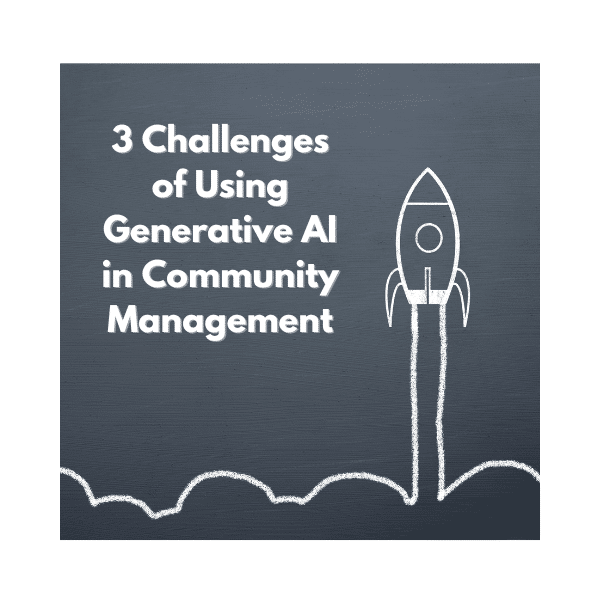As generative AI technologies, like ChatGPT and Bard, continues to develop, it is likely that we will see even more ways in which it can be used to help community managers accelerate the work they do, but like any emerging technology it is evolving, and isn’t without downsides.
Before we dive into 3 challenges of using generative AI in community management, there is one big challenge we want to address on its own.
Generative AI can be misused for malicious purposes, such as generating misinformation, fake news, or deceptive content.

This raises concerns about the potential for user manipulation, fraud, or spreading harmful narratives. Safeguarding against misuse requires responsible usage, content moderation, and proactive measures to ensure the technology is not exploited for harmful intents. As a community manager using generative AI be aware of the content that is generated and always double-check facts and verify any questionable content.
Before starting to use generative AI in your community work, definitely explore what some of the challenges are, and make sure you understand the impact generative AI can have on your work.
3 Challenges of Using Generative AI in Community Management
- Bias: : Generative AI models can reflect biases present in the training data they were exposed to. This can result in biased or unfair outputs, perpetuating societal biases or stereotypes. Addressing and mitigating bias in generative AI remains a significant challenge, requiring careful data curation, model design, and ongoing evaluation. As we strive to build diverse, inclusive community spaces, being aware and correcting for any biases in content generated by AI technologies is critically important.
- Accuracy: Generative AI models are not always accurate, and they can sometimes generate incorrect or misleading information. This can damage the reputation of you as a community manager, your community or overall organization. Our rule of thumb is that ANY content generated by an AI technology is a first draft. Treat generated content the same way your would any first draft content, and make sure it is proofed carefully, and edited for clarity, relevance, and tone.
- Overconfidence and Lack of Transparency: AI models often exhibit overconfidence in their responses, providing answers even when they are uncertain or the information is not available. This creates a false sense of reliability and makes it difficult for readers to gauge the accuracy of the generated content. While generative AI can be a great brainstorming tool, we hesitate to recommend it as a replacement for thoughtfully written, expert content created by community managers and subject matter experts.
Overall, generative AI has the potential to be a powerful tool for community managers to help scale and accelerate some of the rote work being done. However, be aware of the challenges and limitations of this technology before using it in your community so you can avoid mistakes like biased or inaccurate content.
Addressing these challenges requires ongoing research, transparency, and responsible deployment of generative AI models, along with continuous improvements in training methodologies, bias mitigation techniques, and user feedback mechanisms.
Want to learn more about the impact of AI on online community management? Check out this post Four AI Prompts for Community Managers or search “AI” in the search tool above!
